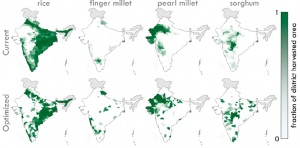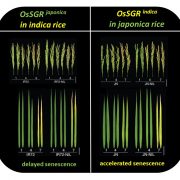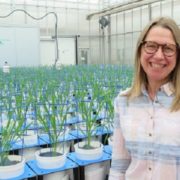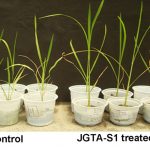Assessing the sustainability of post-Green Revolution cereals in India ($) (PNAS)
 The major objectives of sustainable agriculture are to fulfill food requirements, maintain a safe environment and profitable economy, and withstand climate change. Here, Davis et al. discuss a multidimensional approach to achieve sustainable agriculture in India by transitioning some areas from growing rice to growing coarse grains such as sorghum and millet (also known as Nutri-Cereals). In addition to increasing crop productivity, the authors considered other factors like nutrient status (including protein and iron content), greenhouse gas emissions, resource requirements (manure, fertilizer, labor, energy) and resilience to climate. When considering all of these dimensions, the authors observed a substantial increase in the overall productivity of coarse cereals without impacting the environment in few southern and eastern states of India, but in other regions very minimal to no effect. This suggested that coarse cereals could be beneficial in that it could reduce dependence on synthetic fertilizer and labor input. This transition needs changes in a) policies, b) development of more varieties, c) trading of coarse cereals among the different states and d) evaluation of sustainable methods to cultivate coarse cereals. This study shows that some transitioning from rice to coarse cereal production could meet the food demands and nutrient requirements through a more environmentally friendly and resilient cropping system. (Summary by Suresh Damodaran). Proc. Natl. Acad. Sci. USA 10.1073/pnas.1910935116
The major objectives of sustainable agriculture are to fulfill food requirements, maintain a safe environment and profitable economy, and withstand climate change. Here, Davis et al. discuss a multidimensional approach to achieve sustainable agriculture in India by transitioning some areas from growing rice to growing coarse grains such as sorghum and millet (also known as Nutri-Cereals). In addition to increasing crop productivity, the authors considered other factors like nutrient status (including protein and iron content), greenhouse gas emissions, resource requirements (manure, fertilizer, labor, energy) and resilience to climate. When considering all of these dimensions, the authors observed a substantial increase in the overall productivity of coarse cereals without impacting the environment in few southern and eastern states of India, but in other regions very minimal to no effect. This suggested that coarse cereals could be beneficial in that it could reduce dependence on synthetic fertilizer and labor input. This transition needs changes in a) policies, b) development of more varieties, c) trading of coarse cereals among the different states and d) evaluation of sustainable methods to cultivate coarse cereals. This study shows that some transitioning from rice to coarse cereal production could meet the food demands and nutrient requirements through a more environmentally friendly and resilient cropping system. (Summary by Suresh Damodaran). Proc. Natl. Acad. Sci. USA 10.1073/pnas.1910935116











